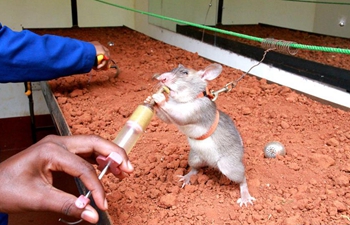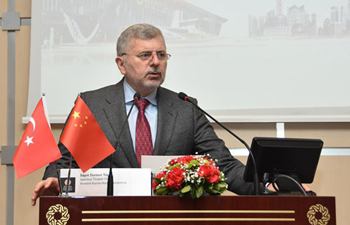WASHINGTON, April 2 (Xinhua) -- American scientists developed a two-prolonged therapy with a combination of drugs that are already available clinically to starve the tumor cells to death.
The Boston Children's Hospital study, published on Monday in the Proceedings of the National Academy of Sciences, has shown that the non-small-cell lung cancer driven by an oncogene called KRAS can be treated after completely blocking IFG-1 signaling.
IGF-1 signaling is a pathway that influences the uptake and release of nutrients and ultimately cell growth, according to the researchers.
"Growth factors like IGF-1 tell cells that nutrients are around, so when you suppress their signaling, the tumor cells don't take up the amino acids," said Nada Kalaany, a researcher in Boston Children's Hospital and the paper's senior author.
Kalaany's team used two groups of mice with KRAS-driven lung cancer. The second group has been deleted with two key genes, known as Irs1 and Irs2, which encode so-called "adaptor" proteins that are necessary for insulin/IGF-1 signaling.
"Almost all animals in this lung cancer model typically die within 15 weeks of KRAS activation," said Kalaany. "But the ones that lost both Irs1 and Irs2 were completely fine, we saw almost no tumors at 10 to 15 weeks."
Metabolic profiling revealed that tumor cells lacking Irs1/2 had significantly lower levels of essential amino acids, the building blocks of protein. Yet, outside the cells, amino acids were plentiful.
But that's not the whole story. When tumor cells "think" that they are starved, according to Kalaany, they can compensate for this and break down their own proteins to generate amino acids.
The researchers tried to inhibit the protein breakdown with existing drugs, such as chloroquine, which inhibits autophagy, and bortezomib, a proteasome inhibitor that is used to treat multiple myeloma.
When Kalaany's team injected human tumor cells lacking Irs1/2 into mice, tumors didn't grow as well. When they added inhibitors of protein breakdown, growth was almost completely suppressed.
"Our work tries to identify metabolic dependencies and vulnerabilities in tumors," said Kalaany.
However, Kalaany warned that, though both types of drugs, as well as IGF-1 inhibitors, are well tolerated, care would need to be taken in dosing any combination therapy to avoid toxicities.

















